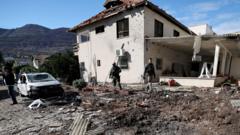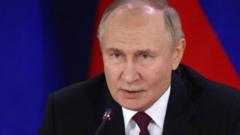Israeli Prime Minister Benjamin Netanyahu has presented a ceasefire deal with Hezbollah, framing it as a result of Israel’s “unprecedented achievements” in what he describes as a seven-front war. Netanyahu claims Israel has set Hezbollah back “tens of years” and significantly weakened the organization.
The ceasefire agreement comes amid complex political and military tensions. Netanyahu emphasized that the deal would allow Israel to “concentrate on the Iranian threat” while maintaining full military freedom to counter any new Hezbollah challenges. In the lead-up to the agreement, Israel’s army reported hitting 180 targets in Lebanon within 24 hours, with constant warnings of potential rocket and drone attacks.
However, the deal has been met with significant internal criticism. A recent poll suggested that over 80% of Netanyahu’s support base opposes the agreement, and many residents in northern Israel – many of whom have been evacuated from their homes – are angry and uncertain about the terms.
Local residents express deep concerns about security. Rona Valency, evacuated from kibbutz Kfar Giladi, voiced unease about Lebanese residents potentially returning to villages near the border. She admitted feeling that only the complete erasure of these villages would make her feel truly safe.
Her husband Onn emphasized the importance of understanding the regional context and expressed distrust in the Lebanese army and American intermediaries. He stated that he only trusts the Israeli military to ensure border security.
The war has indeed delivered significant military achievements for Israel. Hezbollah has been weakened, with its arsenals and infrastructure depleted and its solidarity with Hamas broken. However, the conflict has also taken a substantial toll on Israel, with its armed forces exhausted, the economy suffering, and tens of thousands of residents displaced.
Many are questioning why Netanyahu, who has vowed to continue fighting in Gaza until “total victory,” is now signing a ceasefire in the north. The agreement appears to be a strategic compromise, balancing military objectives with the need to address internal challenges and international pressures.
Neither side wants the ceasefire to be perceived as a surrender. Netanyahu presents it as a strategic victory, highlighting Israel’s military capabilities and strategic positioning. Meanwhile, Hezbollah and Lebanon will likely frame the agreement as a demonstration of their resilience and ability to negotiate.
The ceasefire represents a complex diplomatic and military maneuver, reflecting the intricate geopolitical landscape of the region. It remains to be seen how effectively the agreement will be implemented and whether it will bring the hoped-for stability to the Israel-Lebanon border.
The underlying tensions, historical conflicts, and mutual distrust suggest that while this ceasefire may provide temporary relief, long-term peace remains a challenging and uncertain prospect.




